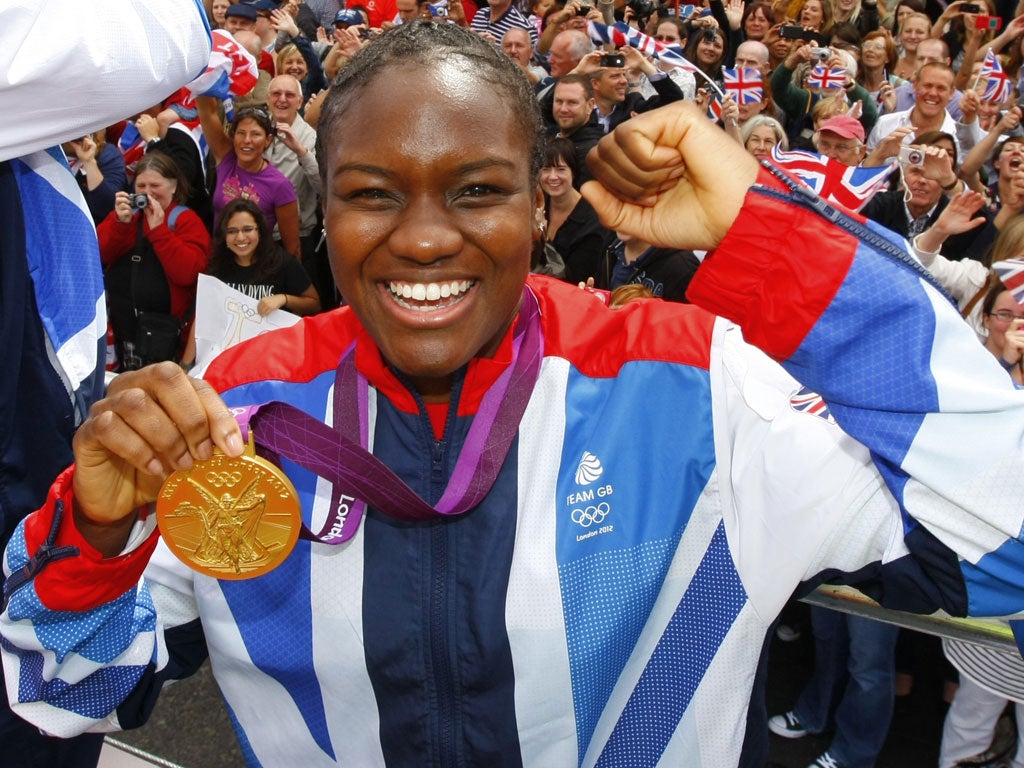Cycling and Boxing benefit from investment increases aimed at delivering more medals at Rio Olympics than London 2012
Basketball, handball, wrestling and table tennis miss out on funding altogether

The body charged with overseeing Britain’s Olympic sports has revealed an ambitious funding plan in an attempt to win more Olympic and Paralympic medals in Rio in 2016 – a feat no nation has managed immediately after a hosting a Games.
UK Sport have set a target of at least 66 Olympic medals and 121 Paralympic medals, each one more than were won in London, in return for a four-year investment in elite sport of £347m. “We are very confident we can be even better in Rio,” said Liz Nicoll, UK Sport’s chief executive. “We are very confident there is more medal potential to come.”
The announcement saw some significant winners with sports such as rowing, boxing, cycling and gymnastics reaping real reward from UK Sport for their success in London. Rowing earned the largest increase with a £5.5m rise after producing the largest number of medallists. Swimming is the biggest loser with its funding reduced by nearly £4m after it failed to meet its 2012 medals target. The sport has also been put on a year’s probation while it finds a new performance director and head coach. In all eighteen sports have seen a rise, five have suffered a cut.
Basketball, handball, wrestling and table tennis received no elite funding at all – they were all given separate monies towards improving participation by Sport England on Monday - which prompted a furious response from British Basketball. Its performance chairman Roger Moreland accusing UK Sport of wasting the £8.5m it had invested in the sport for 2012, a charge echoed by a number of the team sports that lost out.
Moreland, who intends to appeal the decision, said: “This is a devastating decision and is a waste of that investment. It doesn’t seem much of a legacy from 2012 to dash the hopes and aspirations of a sport whose heartland is founded in Britain’s inner cities.”
The success of the Paralympic team, and a recognition that other countries are catching up, saw a 43 per cent rise in the funding handed out to their 19 sports for Rio. In total Paralympic sports will receive £70m with the rest of the £347m divided between 23 Olympic sports.
It is a record investment – more than was spent on Team GB for London which is another first for a nation post-hosting – and will be focused around fewer athletes as it will be a much smaller British team that goes to Rio with the loss of host nation places for the likes of handball and basketball.
Sue Campbell, chair of UK Sport, defended UK Sport’s ruthless approach. Since the “no compromise” programme was introduced in 2001 Britain have finished tenth, fourth and third in the medals table. London was their best performance for more than a century.
“It isn’t about being popular, it’s about making tough, right decisions about where public money goes at a time when we know the economy is under pressure,” said Campbell. “You saw in the summer the power of the high performance system when we get it right. We will unapologetically continue with our athlete-centred, no compromise approach. It doesn’t mean we are not compassionate to those who will find themselves on the wrong end of this but it is compassion without sentimentality. It has to be tough compassion if we are going to continue to improve.”
Winners
Athletics £26.8m (from £25.1m) - 6 medals in London (hit target 5-8 medals)
Boxing* £13.8m (£9.6m) - 5 medals (hit target 3-5 medals)
Canoeing £19.1 (£16.2m) - 4 medals (hit target 3-4 medals)
Cycling £30.6m (£26.0m) - 12 medals (surpassed target 6-10 medals)
Diving £7.5m (£6.5m) - 1 medal (hit target 1-3 medals)
Equestrian £17.9m (£13.4m) - 5 medals (surpassed target 3-4 medals)
Fencing* £3.1m (£2.5m) - 0 medals (hit target 0-1 medals)
Gymnastics £14.5 (£10.7m) - 4 medals (surpassed taregt 1-2 medals)
Hockey £15.5m (£15.1m) - 1 medal (hit target 1-2 medals)
Modern Pentathlon £6.9m (£6.3m) - 1 medal (hit target 1-2 medals)
Rowing £32.6m (£27.3m) - 9 medals (surpassed target 6 medals)
Sailing £24.5m (£22.9m) - 5 medals (hit target 3-5 medals)
Shooting £3.0m (£2.5m) - 1 medal (hit target 0-1 medals)
Synchronised Swimming £4.3m (£3.4m) - 0 medals (hit target 0 medals)
Taekwondo £6.9m (£4.8m) - 2 medals (hit target 1-3 medals)
Triathlon £5.5m (£5.3m) - 2 medals (hit target 1-2 medals)
Water Polo*** £4.5m (£2.9m) - 0 medals (hit target 0 medals)
Weightlifting £1.8m (£1.3m) - 0 medals (hit target 0 medals)
Losers
Archery £3.1m (£4.4m) - 0 medals (missed performance target)
Badminton £5.9m (£7.4m) - 0 medals (missed performance target)
Basketball zero funding (£8.6m) - 0 medals (missed performance target)
Handball zero funding (£2.9m) - missed performance target
Judo* £6.8m (£7.5m) - 2 medals (surpassed target 0-1 medals)
Swimming* £21.4m (£25.1m) - 3 medals (missed target 5-7 medals)
Table tennis zero funding (£1.2m) - missed performance target
Volleyball** £400,00 (£3.5m) - missed performance target
Wrestling zero funding (£1.4m) - missed performance
* first year only guaranteed, remainder pending approval
** funding only for women’s beach volleyball
*** funding only for women’s water polo.
Subscribe to Independent Premium to bookmark this article
Want to bookmark your favourite articles and stories to read or reference later? Start your Independent Premium subscription today.

Join our commenting forum
Join thought-provoking conversations, follow other Independent readers and see their replies